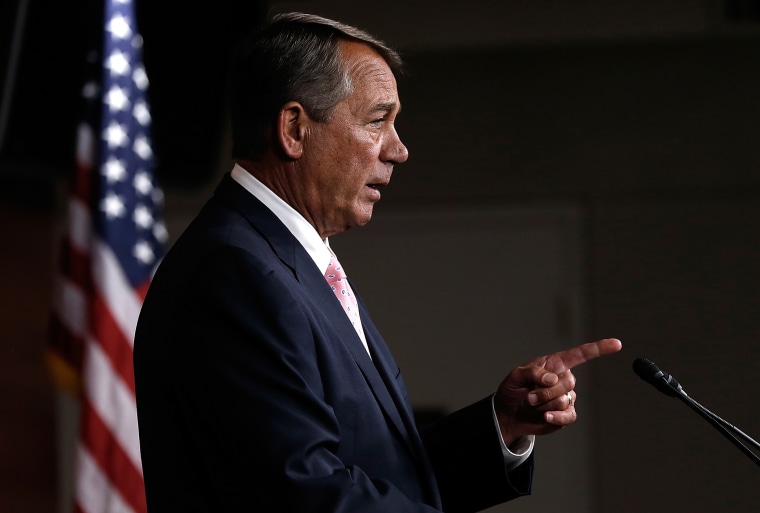After the 2012 elections, it was tempting to think Republicans would be a little more cautious about economic elitism and callous indifference towards those struggling to get by. But in 2014, many GOP officials have thrown caution to the wind and embraced elitism with both arms.
Senate Minority Leader Mitch McConnell (R-Ky.), for example, recently defended cuts to student aid by saying, "
Not everybody needs to go to Yale." As McConnell sees it, the nation's elite institutions of higher ed should be within reach for students from rich families -- and no one else. Soon after, Rep. Tom Cotton (R-Ark.), a leading U.S. Senate candidate, called those who rely on the safety net as "
addicts."
And then there's House Speaker John Boehner (R-Ohio), who appeared at the American Enterprise Institute last week to discuss the economy. Asked about Rep. Paul Ryan's (R-Wis.) anti-poverty plans, Boehner was
quite candid about his thoughts on the unemployed.
"I think this idea that's been born out the last – maybe out of the economy last couple of years that, 'You know, I really don't have to work. I don't really want to do this, I think I'd just rather sit around.' This is a very sick idea for our country."
The Speaker's perspective is bizarre as a matter of public policy, but I'm glad he made these comments because his candor sheds light on an ugly ideology.
When GOP lawmakers cut off extended jobless aid, on a substantive level, it seems bewildering. In recent decades, neither party even considered such radicalism with high unemployment, if for no other reason because cutting jobless aid hurts economic growth. But Boehner has offered a peek behind the curtain -- the Republican argument isn't about economics, so much as it's about personal animosity. The Speaker and his allies seem to think there's something wrong, and perhaps even offensive, about families struggling to get by.
It's part of the same phenomenon that leads GOP officials to demand drug tests for those relying on the safety net. If you need a hand keeping your head above water, it may very well be the result of a drug addiction. If you want a job and can't find one, the argument goes, the problem is almost certainly your fault -- it's because you'd "rather sit around" than work.
It stems from a school of thought that says many social-insurance programs shouldn't exist because struggling Americans are lazy and simply don't deserve public assistance.
I realize that evidence and substance has very little effect in this debate, but Igor Volsky
explained that laziness isn't the real problem.
Currently, there are more than two job seekers for every job opening in the country and the severity of the recession has created a long-term unemployment problem that has made many job seekers almost unemployable. Research shows that being unemployed for nine months has the same impact on your odds of getting hired as losing four full years of experience from a résumé. As a result, many people who lost their jobs have gone back to school, retired early, or continue to look for work without success. In fact, millions of unemployed people are having a harder time finding a job since Congressional Republicans allowed the long-term unemployment benefits program to lapse. Research -- and real world experience -- has found that the program’s job search requirements encourage people to spend more time job hunting and helps cover essentials like internet service for job applications or gas money for interviews.
In theory, Boehner and his allies would be taking a huge risk by making comments like these in an election year. After all, if every unemployed and underemployed American turned out in the fall, furious by the implication that they're lazy, Republicans would be in pretty big trouble.
But the Speaker and his party are confident that those struggling most probably won't participate in the elections -- and those assumptions
are probably correct -- so remarks like these won't come with any consequences.
